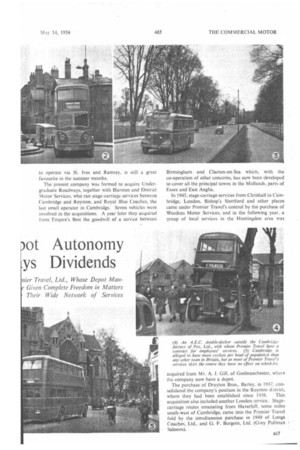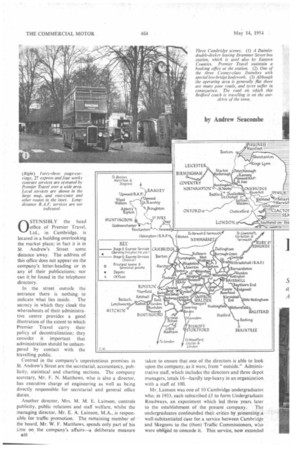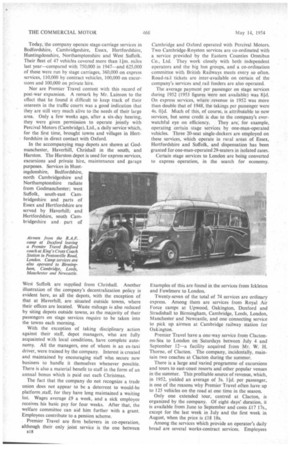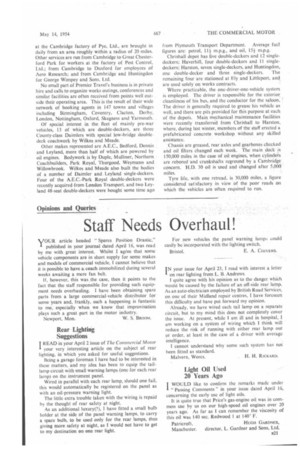ot Autonomy ys Dividends
Page 51

Page 50

Page 52

Page 55

If you've noticed an error in this article please click here to report it so we can fix it.
by Andrew Seacombe
OSi ENS' BLY the head office of Premier Travel, Ltd., in Cambridge, is located in a building overlooking the market place; in fact it is in St. Andrew's Street some distance away. The address of this office does not appear on the company's letter-heading or in any of their publications; nor can it be found in the telephone directory.
In the street outside the entrance there is nothing to
indicate what lies inside. The secrecy in which they cloak the whereabouts of their administrative centre provides a good illustration of the extent to which Premier Travel carry their policy of decentralization; they consider it important that administration should be unhampered by contact with the
travelling public.
Centred in the company's unpretentious premises in St. Andrew's Street are the secretarial, accountancy, publicity, statistical and charting sections. The company secretary, Mr. F. N. Matthews, who is also a director, has executive charge of engineering as well as being directly responsible for secretarial and general office duties.
Another director, Mrs. M. M. E. Lainson, controls publicity, public relations and staff welfare, whilst the managing director, Mr. E. A. Lainson, M.A., is responsible for traffic promOtion. The remaining member of r the board, Mr. W. F. Matthews, spends only part of his time on the company's affairs—a deliberate measure
B16 • taken to ensure that one of the directors is able to look upon the company, as it were, from " outside." Administrative staff, which includes the directors and three depot managers, totals 16—hardly top-heavy in an organization with a staff of 100.
Mr. Lainson was one of 10 Cambridge undergraduates who, in 1933, each subscribed £5 to form Undergraduate Roadways, an experiment which led three years later
to the establishment of the present company. The undergraduates confounded theic critics by presenting-a well-substantiated case for a service between Cambridge and Skegness to the (then) Traffic Commissioners, who were obliged to concede it. This service, now extended
to operate via St. Ives and Ramsey, is still a great favourite in the summer months.
The present company was formed to acquire Undergraduate Roadways, together with Harston and District Motor Services, who ran stage-carriage services between Cambridge and Royston, and Royal Blue Coaches, the last small operator in Cambridge. Seven vehicles were involved in the acquisitions. A year later they acquired from Empire's Best the goodwill of a service between Birmingham and Clacton-on-Sea which, with the co-operation of other concerns, has now been developed to cover all the principal towns in the Midlands, parts of Essex and East Anglia.
In 1945, stage-carriage services from Chrishall to Cambridge, London, Bishop's Stortford and other places came under Premier Travel's control by the purchase of Weedens Motor Services, and in the following year, a group of local services in the Huntingdon area was acquired from Mr. A. J. Gill, of Godmanchester, where the company now have a depot.
The purchase of Drayton Bros., Barley, in 1947, consolidated the company's position in the Royston d:strict, where they had been established since 1936. This acquisition also included another London service. Stagecarriage routes emanating from Haverhill, some miles south-west of Cambridge, came into the Premier Travel fold by the simultaneous purchase in 1949 of Longs Coaches, Ltd., and G. F. Burgoin, Ltd. (Grey Pullman Saloons). Today, the company operate stage-carriage services in Bedfordshire, Cambridgeshire, Essex, Hertfordshire, Huntingdonshire, Northamptonshire and West Suffolk. Their fleet of 47 vehicles covered more than 1 jrn. miles last year—compared with 750,000 in I947—and 625.000 of these were run by stage carriages, 360,000 on express services, 110,000 by contract vehicles, 100,000 on excursions and 100,000 on private hire.
Nor are Premier Travel content with this record of post-war expansion. A remark by Mr. Lainson to the effect that he found it difficult to keep track of their interests in the traffic courts was a good indication that they are still very much alive to the needs of their large area. Only a few weeks ago, after a six-day hearing, they were given permission to operate jointly with Percival Motors (Cambridge), Ltd., a daily service which, for the first time, brought towns and villages in Hertfordshire in direct contact with Oxford.
In the accompanying map depots are shown at Godmanchester, Haverhill, Chrishall in the south, and Harston. The Harston depot is used for express services, excursions and private hire, maintenance and garage purposes. Services in Huntingdonshire, Bedfordshire, north Cambridgeshire and Northamptonshire radiate from Godmanchester; west Suffolk, south-east Cambridgeshire and parts of Essex and Hertfordshire are served by Haverhill; and Hertfordshire, south Cambridgeshire and. part of West Suffolk are supplied from Chrishall. Another illustration of the company's decentralization policy is evident here, as all the depots, with the exception of that at Haverhill, are situated outside towns, where their offices are located. Waste mileage also reduced by siting depots outside towns, as the majority of their passengers on stage services require to be taken into the towns each morning.
With the exception of taking disciplinary action against their staff, depot managers, who are fully acquainted w:th local conditions, have complete autonomy. All the managers, one of whom is an ex-taxi driver, were trained by the company. Interest is created and maintained by encouraging staff who. secure new business to handle it themselves whenever possible. There is also a material benefit to staff in the form of an annual bonus which is paid out each Christmas.
The fact that the company do not recognize a trade union does not appear to be a deterrent to would-be platform staff, for they have long maintained a waiting list. Wages average £9 a week, and a sick employee receives his basic pay for four weeks. After that, the welfare committee can aid him further with a grant. Employees contribute to a pension scheme.
Premier Travel are firm believers in co-operation, although their only joint service is the one between B18 Cambridge and Oxford operated with Percival Motors. Two Cambridge-Royston services are co-ordinated with a service provided by the Eastern Counties Omnibus Co., Ltd. They work closely with both independent operators and the big bus groups, and a co-ordination committee with British Railways meets every so often. Road-ra.I tickets are inter-available on certain of the company's services and rail feeders are also operated.
The average payment per passenger on stage services during 1952 (1953 figures were not available) was 8id. On express services, where revenue in 1952 was more than double that of 1948, the takings per passenger were 4s. Old. Much of this, of course, is attributable to new services, but some credit is due to the company's ever watchful eye on efficiency. They are; for example, operating certain stage services by one-man-operated vehicles. Three 20-seat single-deckers are employed on these services, which operate in rural areas of Essex, Hertfordshire and Suffolk, and dispensation has been granted for one-man-operated 29-seaters in isolated cases.
Certain stage services to London are being converted to express operation, in the search for economy.
Examples of this are found in the services from Ickleton and Fowlmere to London.
Twenty-seven of the total of 74 services are ordinary express. Among them are services from Royal Air Force camps at Upwood, Oakington, Duxford and Stradishall to Birmingham, Cambridge, Leeds, London, Manchester and Newcastle, and one connecting service to pick up airmen at Cambridge railway station for Oakington.
Premier Travel have a one-way service from Clactonon-Sea to London on Saturdays between July 4 and September I2—a facility acquired from Mr. W. H. Thorne, of Clacton. The company, incidentally, maintain two coaches at Clacton during the summer.
There is a large and varied programme of excursions and tours to east-coast resorts and other popular venues in the summer. This profitable source of revenue, which, in 1952, yielded an average of 3s. 10. per passenger, is one of the reasons why Premier Travel often have up to 125 vehicles on the road at one time in the season.
Only one extended tour, centred at Clacton, is organized by the company. Of eight days' duration, it is available from June to September and costs £17 17s., except for the last week in July and the first week in August, when the price is £18 18s.
Among the services which provide an operator's daily bread are several works-contract services. Employees at the Cambridge factory of Pye. Ltd., are brought in daily from an area roughly within a radius of 20 miles. Other services are run from Cambridge to Great Chesterford Park for workers at the factory of Pest Control, Ltd.; from Cambridge to Duxford for employees of Aero Research; and from Cambridge and Huntingdon for George Wimpey and Sons, Ltd.
No small part of Premier Travel's business is in private hire and calls to organize works outings, conferences and similar facilities are often received from points well outside their operating area. This is the result of their wide network of booking agents in 147 towns and villages including Birmingham, Coventry, Clacton. Derby, London, Nottingham, Oxford, Skegness and Yarmouth.
Of special interest in the fleet of mainly pre-war vehicles, 13 of which are double-deckers, are three County-class Daimlers with special low-bridge doubledeck coachwork by Wilkes and Meade..
Other makes represented are A.E.C., Bedford, Dennis and Leyland, more than half of which are powered by oil engines. Bodywork is by Duple, MuHiner, Northern Coachbuilders, Park Royal, Thurgood, Weymann and Willowbrook. Wilkes and Meade also built the bodies of a number of Daimler and Leyland single-deckers. Four of the A.E.C.-Park Royal double-deckers were recently acquired from London Transport, and two Leyland 48-seat double-deckers were bought some time ago from Plymouth Transport Department. Average fuel figures are: petrol, 111 m.p.g., and oil, 15+ m.p.g.
Chrishall depot has five double-deckers and 12 singledeckers; Haverhill, four double-deckers and 11 singledeckers; Harston, seven single-deckers, and Huntingdon, one double-decker and three single-deckers. The remaining four are stationed at Ely and Littleport, and are used solely on works contracts.
Where practicable, the one-driver-one-vehicle system is employed. The driver is responsible for the exterior, cleanliness of his bus, and the conductor for the saloon. ' The driver is generally required to grease his vehicle as well, and there are pits provided for this purpose at each of the depots. Main mechanical maintenance facilities N.Vere recently transferred from Chrishall to Harston, where, during last winter, members of the staff erected a prefabricated concrete workshop. without any skilled assistance.
'Chassis are greased, rear axles and gearboxes checked and oil filters changed each week. The main dock is 150,000 miles in the case of oil engines, when cylinders are rebored And crankshafts reground by a Cambridge cOncern. H.D. 30 oil is -used and changed after 5,000 miles.
Tyre life, with one retread, is 30,000 miles, a figure considered satisfactory in view of the poor roads on which the vehicles are'often required to run.




































































































